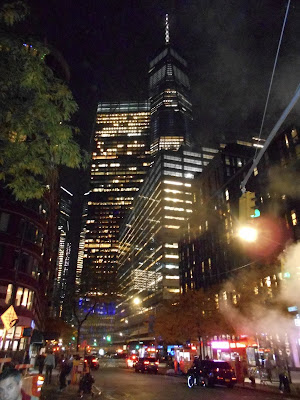 |
World Trade Center 2020
|
Two nights ago there was an electricity outage on the Upper West Side, which is where I live. From the
short account in the newspaper, it seems to have been rather limited as these things go. In Sointula over the years I experienced several blackouts, one, as I remember, caused by some natural occurrence (a tree took out a power line?) on Vancouver Island, which likewise affected Malcolm Island. Looking back on those blackouts in Sointula, I don't recall being very disturbed or even inconvenienced, beyond being unable to read by candlelight.
When such an outage occurs in a big city, however, the effect is much different, although the time of day makes a difference. For instance, January 6, 2019 -- I later made note of the details in my diary -- happened to be the coldest day of the winter season thus far. It was on that cold day that, at 9 p.m., the electricity went out of my side of the West 87th Street. Across the street, my neighbors' apartment buildings were still lit up. I suspect that our bad luck had to do with the massive amount of road repair that was going on during those months on my street and others on the Upper West Side. Shortly after the lights went out, my cell phone rang -- that little flip phone that I own solely because I need it in Sointula -- and my neighbor Elaine (mentioned in previous post) was on the line, inviting me to come over and sit before the fireplace with her and her son Kieran. Which I promptly did. They had plenty of wood, and we sat until midnight, til every last stick of wood had been burnt, and drank wine and talked. It was a particularly good occasion. Elaine, too, is a widow, and I had known her husband, Peter, long before I knew Elaine, the way you know people who live on your street. Her son Kieran was with us, and he liked hearing my memories of Peter, since Kieran was only six years old when his father died. When I went home at midnight, there was still enough hot water in the pipes that I was able to fill a water bottle for bed. By daylight the power was back.
 |
Upper West Side roadwork
|
Flash forward to power outage of August 2020. This one, according to the news item, took place around 5 a.m. In other words, I was in bed and asleep. Suddenly, I woke up. It was as if the lack of noise in my apartment -- the ceiling fans no longer rotating, the air conditioner off -- roused me from my sleep. It took only an instant for me to register what the lack of noise meant, and I was on my feet. Normally, in the middle of the night, when I go to the bathroom or get up for some water -- there is plenty of light. My apartment faces the street and my windows are very high, so that the lights of the buildings across the street, whether in apartments or from outdoor sources, send enough light into my apartment that I can make my way comfortably in the dark to the bathroom. On this occasion, however, it was dark, dark in my rooms and likewise across the street. I walked to the windows in the living room and looked out. It was very eerie, and it struck me forcibly how vulnerable a city is, dependent as it is on an immense infrastructure to "power" it. Powering, not only in the sense of electricity and water and fuel, but also its people, who are dependent on that infrastructure to go about their daily business. Although I have none of the skills of my Sointula friends -- fishing, farming, even growing herbs -- I did not feel endangered by the blackouts there. Unconsciously, I must have felt that the people of Malcolm Island would have come together to help one another in the event of a long period without electricity.
New York City is a different matter. Imagine the effect on me and my fellow New Yorkers had this blackout continued beyond half an hour. The heatwave is for the moment behind us -- yesterday I finally was able to open the windows and have fresh, almost cool air -- but the temperature of many people still runs high. I fear for what might have happened had it continued.


No comments:
Post a Comment